
There’s a high increase in the market on dog supplements, which while good for options, makes it more difficult to know and choose what’s right and appropriate.
In the first place, does my dog need supplements? High-quality and natural dietary supplements can be extremely beneficial to your dog’s health and longevity. Plus, they guarantee that your dog is getting the right nutrients.
So it’s no surprise that dietary supplements for dogs are becoming increasingly popular with dog parents.
Does My Dog Need Supplements?
It may not seem obvious right now what role supplements play, but it is an important part of your dog’s future in order to live well.
A lot of the times, your dog may not get enough nutrients from their meals. Especially if they become sick or as they age, supplementations are required for their upkeep and health.
Nevertheless, work with your vet to determine what types of supplements are best for your dog and follow the instructions for the right dosage.
Here are some quick highlights on the use of supplements for your dog:
- Vitamin and mineral supplements are the most important components in any dog’s feeding.
- A balance of vitamin and mineral supplements is what guarantees your furry friend will have a healthy life, by making sure his immunity is not compromised in an unwanted way. This simply means that your dog will be more resistant to disease and fighting off various illnesses.
- Best practises for supplements is to add them to your dog’s fresh food at mealtime.
- Avoid processed diets containing added supplements, as manufacturing processes tend to eliminate the good properties of these supplements.
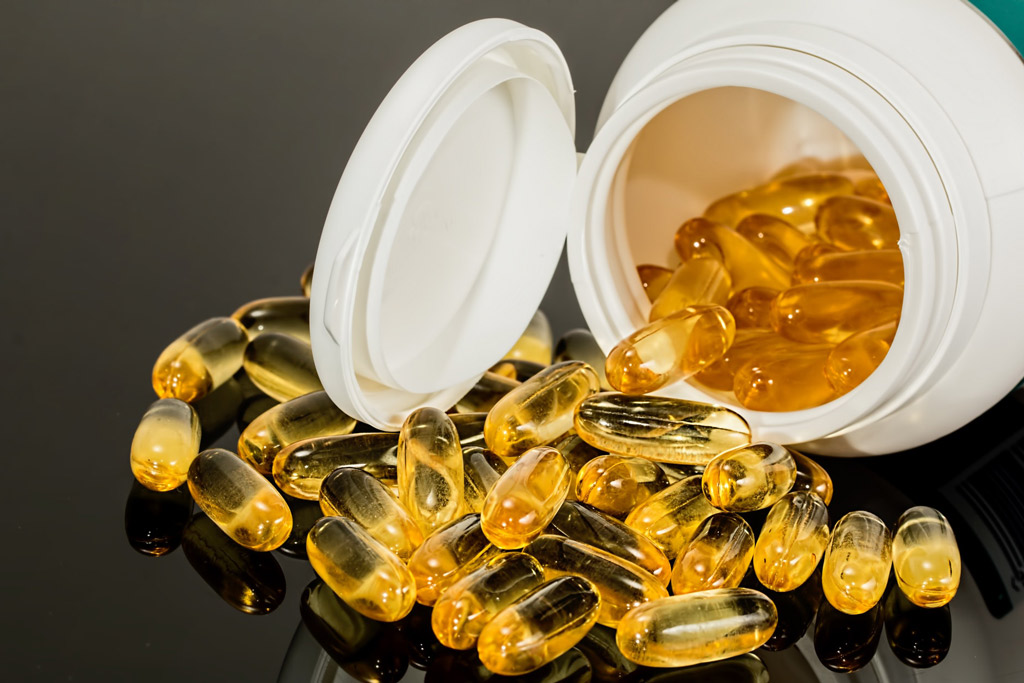
A Brief Note on Vitamins
As a dog owner, there are a couple of things to know about vitamins:
- Vitamins A, D, E, and K are the fat-soluble vitamins.
- Others are water-soluble vitamins.
- Vitamins like thiamine, pyridoxine and cyanocobalamin are important for the functions of the nervous system.
- Deficiency of vitamin A leads to night blindness and skin lesions.
- Deficiency of vitamin D leads to the softening and weakening of the bones. These are common problems for dogs.
However, as much as deficiencies can be a problem, so is feeding them in excessive amounts. So when giving vitamins to your dog, the dosage is highly important.
For example, if your dog is regularly fed with fish in frozen conditions, then they may end up suffering from vitamin B1 deficiency i.e. they would need to be given more specific B1 to supplement.
A Brief Note on Minerals
Here are some things to consider about minerals:
- Minerals like calcium, magnesium, zinc, manganese, iron, copper etc. are given more emphasis in addition to sodium and potassium.
- Zinc is related to skin health.
- Potassium is related to muscle health.
- Calcium, with phosphorus, is related to bone health.
And don’t forget… Your vet should always be consulted on the matter as uninformed supplementations of vitamins or minerals may lead to diseases.
Insider Tip: Feeding your doggy foods like chicken, mutton or beef along with required vegetables can highly reduce the need for artificial supplementation of mineral or vitamin tablets.
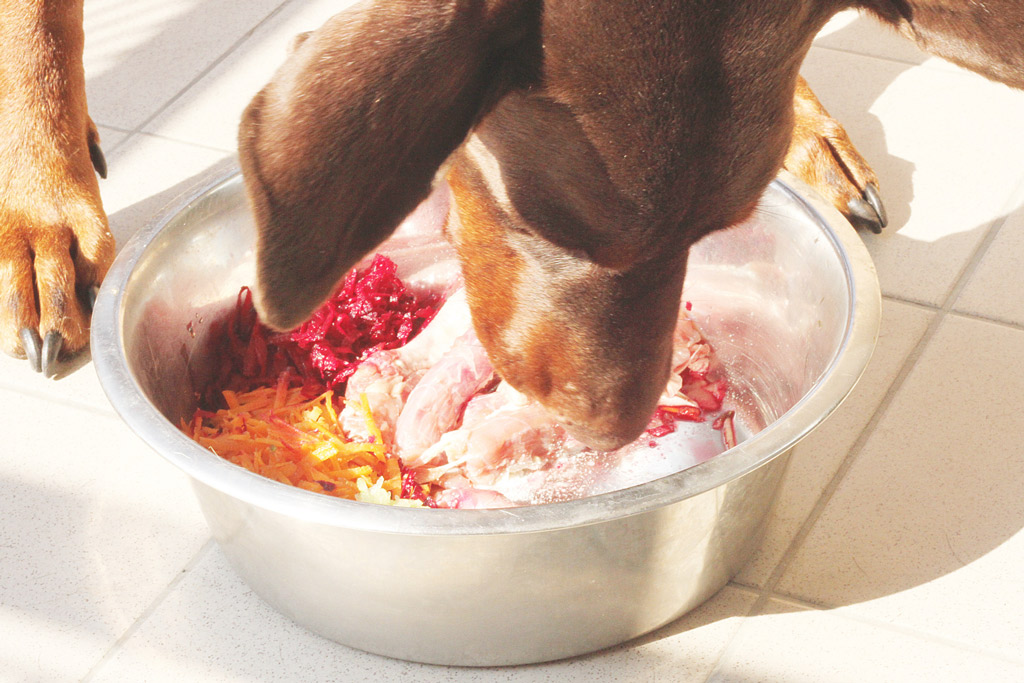
Types of Natural Dog Supplements
It’s more digestible to group supplements into categories:
- Gastro-Intestinal (GI) tract.
- Liver and kidney.
- Heart.
- Joint.
- Cognitive.
- Skin and coat health.
These are what we’re going to be talking about right now.
Natural Dog Supplements for a Healthy Gastro-Intestinal Tract
The digestive tract is the largest immune organ in your dog’s body. Surprisingly, your pooch has even more intestinal bacteria than you do, despite their much smaller size.
A healthy population of friendly bacteria keeps your dog’s immune system in good working order, while on the contrary, the bad intestinal bugs create an imbalance which leads to your pet eventually developing an illness.
Studies show that animals raised without friendly bacteria in their gut, or with a poor balance of good-to-bad gut bacteria, are at dramatically increased risk for contracting a disease.
So how do you promote healthy digestion for your dog? There are two exceptionally beneficial supplements for this:
- Probiotics.
- Digestive enzymes.
Probiotics
Probiotics are good bacteria that promote healthy levels of the good bacteria that are already in your dog’s GI tract. Also, they defend against pathogenic bacteria i.e. disease and illness.
For probiotics to work, the bacteria in them must be live and able to reproduce, otherwise they won’t provide any benefits.
When researching supplements for your dog, you should have two things in mind:
- Avoid human probiotics. They are developed to fortify the bacterial species found in the human GI tract. Dogs, however, have specific strains of bacteria that are unique to them. So they need a unique probiotic, not a human graded probiotic.
- Avoid probiotics added to commercial dog food like kibble. Tests show that the bacteria is not alive in commercial food that contains probiotics, since, for instance, the manufacturing process kills too many of the live bacteria.
Insider Tip: Look for a dog probiotic that:
– Can survive the acidic environment of your dog’s stomach.
– Contains enough live organisms to colonize the intestines.
– Also contains the correct strains of bacteria beneficial for dogs (not humans).
– Remains stable under normal storage conditions and be easy to give to your dog.

Digestive Enzymes
When your dog eats, the pancreas gets a signal to release digestive enzymes. These enzymes travel via the pancreatic duct into the small intestine, where they break down food.
They allow nutrients from the diet to be absorbed by the cells of the intestine, where they pass into the bloodstream and are transported throughout the body for use by tissues.
If there is a decrease or lack of digestive enzymes being produced by the pancreas, your pet suffers from EPI (Exocrine pancreatic insufficiency).
As a consequence, proteins, starches and fats from the diet aren’t broken down sufficiently to be absorbed through the intestinal wall.
Insider Tip: High-quality digestive enzymes for dogs should be sourced from animals (not plants or fungi), and should ideally contain some or all of these ingredients:
– Betaine HCI.
– Ox bile extract.
– Bromelain.
– Papain.
– Pancreatin.
– Protease.
– Amylase
– Lipase.
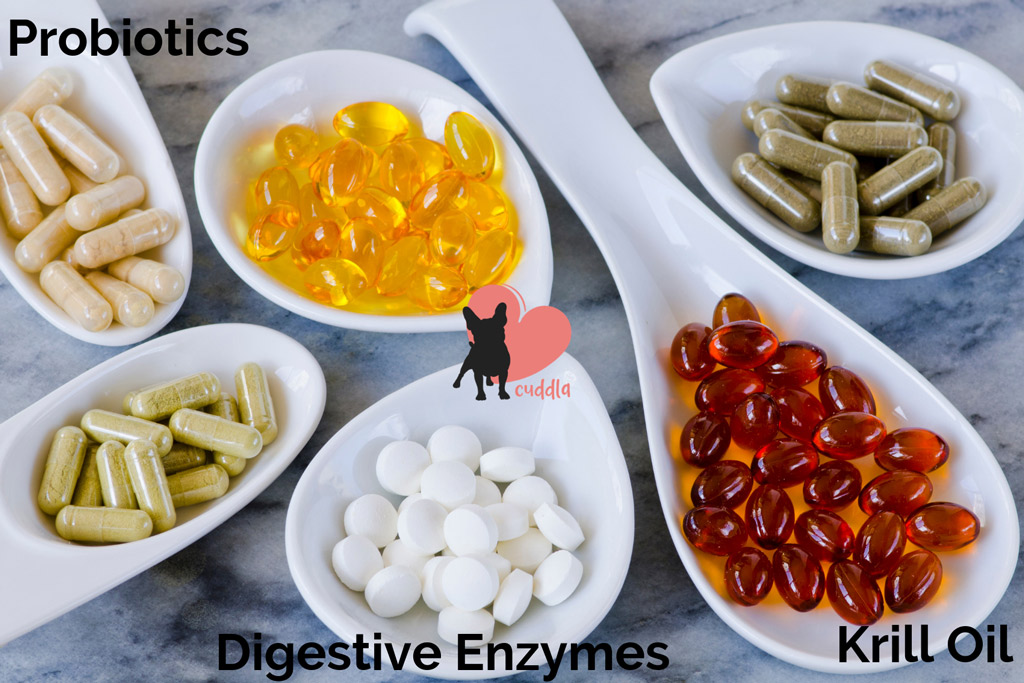
Natural Dog Supplements for Liver and Kidney Support
There are a number of wonderful supplements to support your dog’s detoxification organs. Both liver and kidney support agents include:
- Milk thistle.
- SAMe.
- L-glycine.
- Phosphatidylcholine.
- Curcumin.
- Taurine.
- N-acetyl L-cysteine.
- Resveratrol.
- Schisandra extract.
- Green tea leaf extract (decaffeinated).
- L-glutathione.
- Chlorella.
- Superoxide dismutase.
- Dandelion leaf.
- Silica.
It’s always best to talk to your veterinarian about your dog’s individual needs.
Insider Tip: In order to help your dog avoid kidney and urinary tract disease, be sure to feed a moisture-rich, species-appropriate diet to minimize stress on his vital organs.
To find out more on what to feed your dog, check out our Dog Nutrition post.

Natural Dog Supplements for a Healthy Heart
A very important supplement for your dog’s heart health is CoQ10, or more specifically, ubiquinol, the reduced form of CoQ10.
As your pooch gets older, his body has less ability to convert CoQ10 to its active form, ubiquinol. That’s why ubiquinol is more appropriate for senior dogs.
Insider Tip: Dogs who can most benefit from ubiquinol supplementation include:
– Dogs who need additional cardiovascular support.
– All dogs aged 7 and older that can benefit from mitochondrial support.
– Dogs who are competitive athletes.
CoQ10 is a coenzyme that nearly every one of your dog’s body functions depends on – every cell, every organ, and every tissue. This coenzyme is a compound produced naturally in the liver.
Cells use CoQ10 to support their energy and growth, and cells with the fastest turnover, including heart cells, mouth tissue cells, intestinal mucosal cells and immune system cells, demand high levels of CoQ10.
Also, this enzyme contributes to healthy circulation, promotes optimal immune function, supports the healthy presence of oxygen in tissues and supports cardiovascular health.

Natural Dog Supplements for Joints
It’s important to note that a natural, species-appropriate diet is the best way to enhance the comfort and function of your dog’s joints.
It’s also critical to maintaining your dog at a healthy body weight to not put excess stress on his joints. This is why your pooch needs appropriate exercise in order to help maintain healthy muscle mass and joint flexibility.
And for 1 in 5 dogs, especially large and giant breeds, support for optimal hip and joint help can be of tremendous benefit. In fact, dogs may need support long before they enter their senior years.
Insider Tip: A very important component of an effective joint health supplement for dogs is the eggshell membrane. It’s a source of elastin, collagen and glycosaminoglycans, that supports the stability and flexibility of your pet’s joints.
Other excellent joint support agents include:
- Glycosaminoglycans (GAGs)
- Cetyl myristoleate (CMO).
- Collagen type II.
- Green-lipped mussel.
- And methylsulfonylmethane (MSM).

Natural Dog Supplements for Cognitive Health
Nutraceuticals (foods that provide medical or health benefits) can significantly improve memory, and the effects are long-lasting.
Studies of medium-chain triglycerides (MCTs), such as coconut oil, show they can significantly improve cognitive function in older dogs.
MCTs provide an alternative energy source (instead of glucose) for the brain in the form of ketone bodies, which can dramatically improve brain metabolism and cellular energy within the central nervous system. Ketones are made from fat and your pet’s brain is about 60% fat, and that fat needs to be appropriately fueled as he ages.
Supplementing with MCTs is a great way to offer an instant fuel source for your dog’s brain.
Insider Tip: I recommend 1/4 teaspoon per every 10 pounds of your dog’s body weight, added daily to your dog’s meal.
Dr Karen Becker, an integrative veterinarian.
Apart from MCT oil, other supplements to consider are:
- A source of SAMe (S-adenosyl methionine).
- Superoxide dismutase (SOD)s.
- And resveratrol, which is Japanese knotweed.
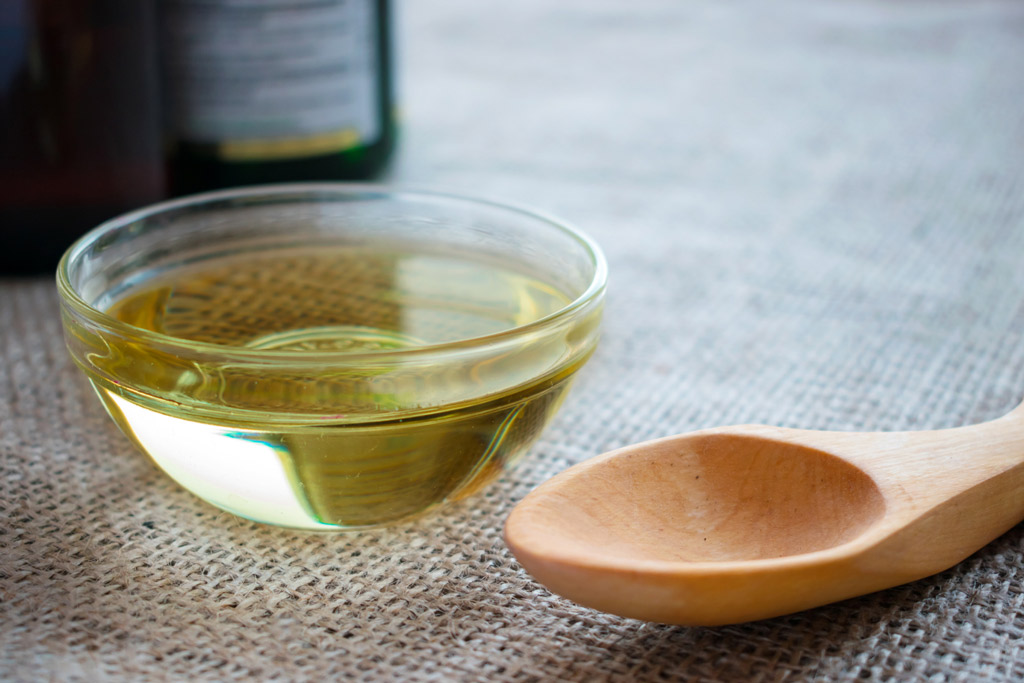
Natural Dog Supplements for a Healthy Coat
Dietary supplements for the health of your dog’s skin and coat typically contain essential fatty acids, often a blend of omega-3s, -6s and -9s.
The problem with many of these blended supplements is that most dogs today, especially those eating processed dog food, get an overabundance of omega-6s and not enough omega-3s.
A combination of inexpensive grain and corn-based ingredients, vegetable oils (corn, soy, safflower, canola, most of them genetically modified) and fats from chicken and meat create pet food packed with omega-6 fats.
In addition, the omega-3 fats used in most commercial dog foods come from plant or vegetable sources, and the manufacturing process typically destroys what value these ingredients have.
Insider Tip: The best essential fatty acid supplement is an omega-3 supplement made from marine oils, such as krill oil.
Note: Continue reading to find out more about coconut oil remedies and more on skin health.
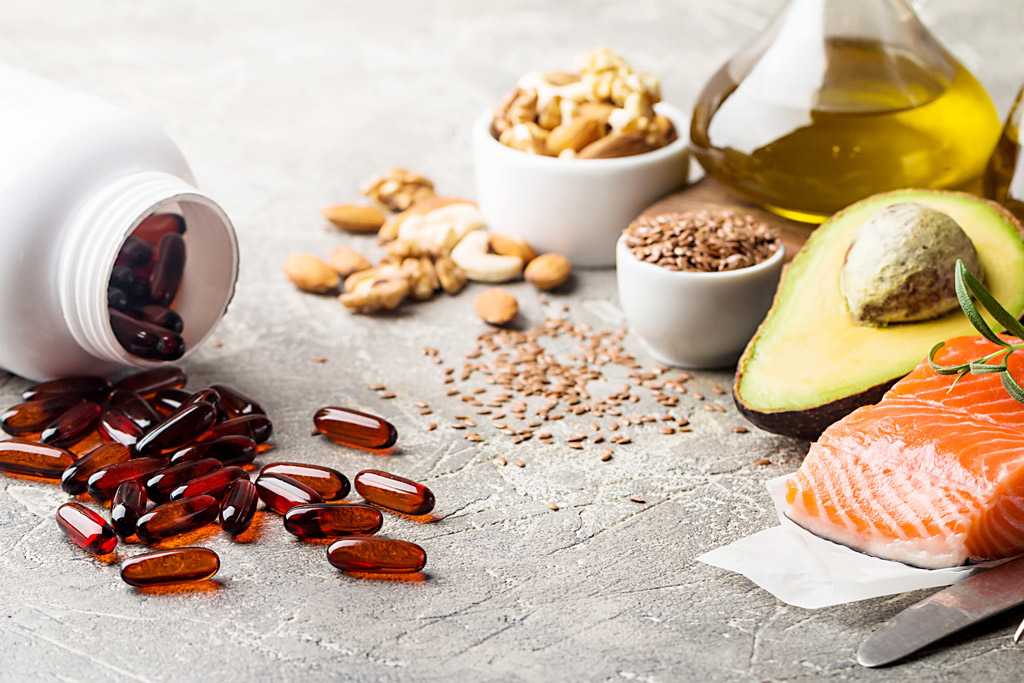
Other Natural Dog Supplements and Remedies
Does your doggy have dry skin, stomach problems, or other health issues?
Wouldn’t it be better to treat the condition with a plant from your backyard garden instead of a pricey prescriptive medicine that may come with unwanted side effects?
“We are not suggesting dog owners ‘play’ veterinarian, but there are certainly minor issues that can be treated with herbs, dietary changes, probiotics and homoeopathy.”
Elisa Katz, an expert in holistic medicine who operates the Holistic Veterinary Center in Illinois.
In fact, you may be surprised to learn that some safe natural remedies for dogs can be easily found in your garden, your kitchen cabinet and local health store. In some instances, you can save on a veterinary visit without the risk of damaging your dog’s health.
Check out these veterinarian-approved natural remedies for dogs to help your furry friend get better and to maintain their optimal health.

Turmeric/Curcumin
Turmeric is a bright-yellow spice plant. The active ingredient in turmeric is curcumin, which is found in the roots and bulbs of the plant. Because of its properties, this plant has been used for thousands of years in Ayurvedic and Traditional Chinese Medicine (TCM).
More recently, Western and holistic medicine evidence points to the benefits of turmeric in supporting healthy organ function in humans and animals due to its many properties, like:
- Antioxidant.
- Anti-inflammatory.
- Antiviral.
- Antibacterial.
- Antifungal.
- And anticancer properties.
In addition, scientists believe curcumin may have a very significant potential effect against a variety of malignant diseases like:
- Diabetes.
- Allergies.
- Arthritis.
- And other chronic conditions.
You can supplement your dog’s diet with plain turmeric since most dogs readily accept a little seasoning on their meals.
However, if you want to dramatically increase the amount of biologically available curcumin in your dog’s diet, you’ll need to go with a supplement.
- Small to medium-sized dogs: 250 milligrams twice a day.
- Large to giant breeds: 500 milligrams two to three times a day.
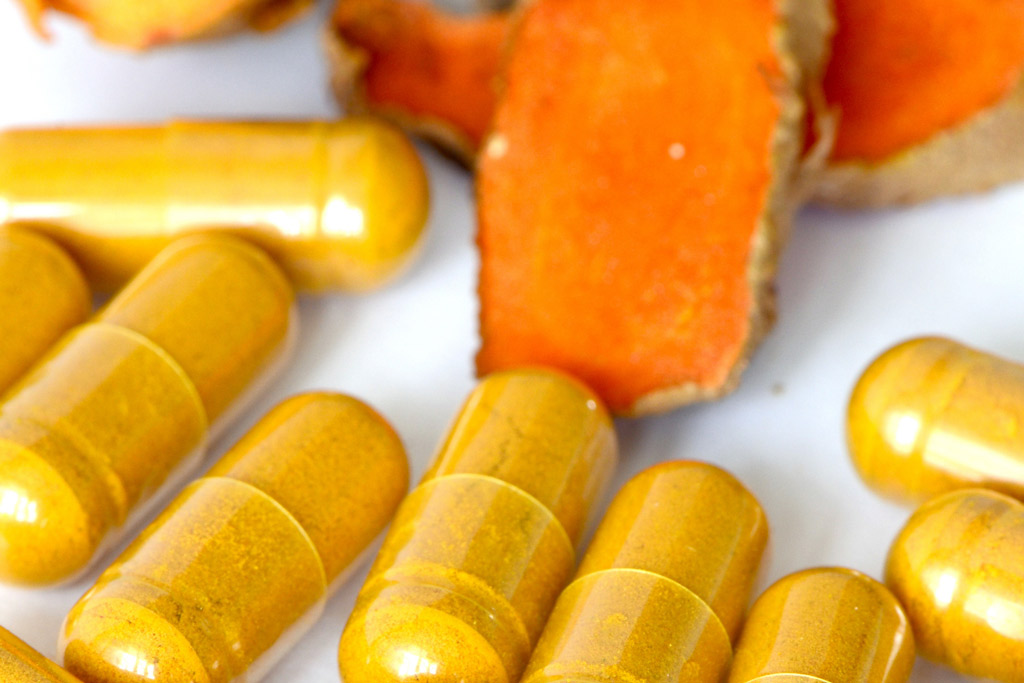
Coconut Oil
Coconut oil is a concentrated source of medium-chain triglycerides (MCTs), and it has many benefits not only for humans but also for dogs.
Here is a list of reasons why coconut oil benefits your dog:
#1 – Skin Health
It improves skin health and clears up conditions like flea allergies, eczema, itchy skin, and contact dermatitis.
#2 – Antimicrobial Properties
Coconut oil is a powerful antimicrobial agent, it has antifungal and antibacterial properties as well. That’s why it helps heal and relieve cuts, hot spots, wounds, stings, and bites.
#3 – Skin Moisturizer
This oil is also a rich source of lauric acid. It moisturizes dry skin and gives your dog’s coat a shiny gleam.
#4 – Odor Reduction
It reduces doggy odour when applied to their skin; plus doggy breath when used as part of dental treatment.
#5 – Infection Prevention Properties
It helps prevents yeast infections, particularly candida.
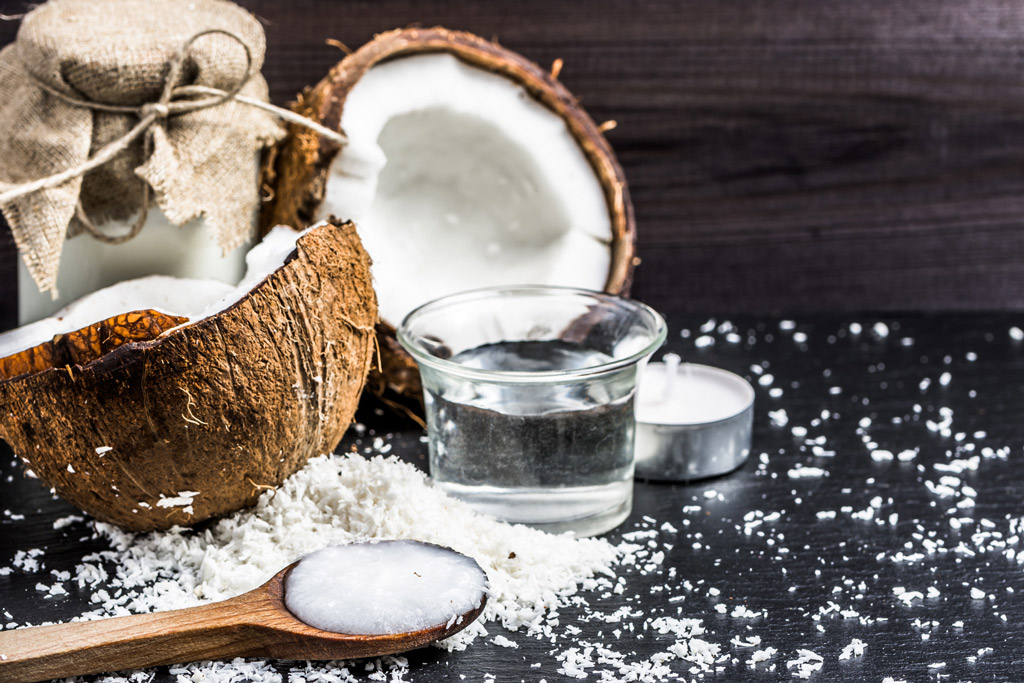
#6 – Kennel Cough Treatment
Dogs suffering from kennel cough may recover faster with coconut oil.
#7 – Nutritional Advantages
It improves nutrient absorption and digestion. Although be aware that it may cause loose stools, so moderation is still crucial.
#8 – Illness Prevention
It can help reduce your dog’s risk of diabetes by regulating your dog’s insulin levels.
It may also moderate thyroid function and keep infections and heart disease at bay.
#9 – Joint Health
Coconut oil promotes mobility in arthritic dogs and those with joint issues.
#10 – Brain Health
It can benefit brain health and may be helpful for senior dogs whose minds are starting to become “cloudy.”
Arnica
It’s a great option for bruises or sore muscles.
This homoeopathic medicine is from a sunflower perennial that blooms in the early spring and is also known as Leopard’s Bane. It is available in pellets, creams and gel forms at health stores.

Green Tea
To clean a minor wound, you can use a 50-50 mix of green tea and water on a clean gauze pad since green tea contains antiseptic properties.

Apple Cider Vinegar
It can be used to clean wax from your dog’s ears.
First, sniff and inspect inside your dog’s ear to make sure there are no signs of mites (looks like coffee flakes) or anything else that you might want to discuss with your veterinarian first.
Then mix warm water and apple cider vinegar. Dunk a cotton ball in the mixture, squeeze out the liquid, then clean your dog’s ears. Finally, repeat until the ear is sufficiently clean.

Aloe Vera
Apply the gooey gel from an aloe vera plant on your dog’s skin, pinkened by the sun’s rays or early signs of an itchy hot spot. Aloe vera acts as a great natural skin soother due to its anti-inflammatory and antibacterial properties.
However, beware that the white sap of an aloe vera plant (called latex) is toxic to dogs. Consult your veterinarian before using any commercial aloe vera creams.

Lavender
Dogs are social creatures who get lonely and bored when forced to stay alone for long stretches.
Lavender is a great herb that helps calm their anxiety. The essential oil of lavender has also been proven to reduce a dog’s stress response. You can place two drops on your dog’s collar or bedding before a stressor occurs.
Otherwise, you can use a diffuser around your house for an overall calming effect. For more tips on the different ways to soothe dog anxiety, check out the How to calm dog fears and anxiety blog post.

Chamomile
Calming herbs that can be of benefit also include chamomile. You can make an infusion and place it in his water bowl.
If unsure, always consult with your holistic veterinarian about which remedy makes more sense for your pet.

Want more dog care tips? Check out our The 5 pillars to a happy and healthy dog blog post.
